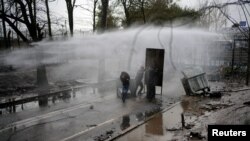Greeks and Turks are waging a proxy war on social media with photos, video and commentary purporting to show the other side behaving badly in a migrant crisis that has seriously strained already tense relations between Athens and Ankara.
An estimated 35,000 migrants from the Middle East, Afghanistan, Pakistan and elsewhere have been trying to enter Greece, a European Union member state, since Ankara said on Feb.
28 it would no longer keep migrants on its territory as required under a 2016 deal with the European Union in return for aid.
Greece has used tear gas and water cannon to hold them back.
On Greek Twitter, the hashtags GreeceUnderAttack and GreeceDefendsEurope have become common. On Turkish Twitter KahpeYunan (GreekBitch) was briefly a trending topic. Foreign Minister Mevlut Cavusoglu used the tag GreeceAttacksRefugees.
One video circulating on Monday appeared to show a tractor on the Greek side spraying liquid towards the border fence, dousing hundreds of migrants gathered on the Turkish side.
Some Greek social media users speculated it was a farmer spraying pig urine along the border. Turkish social media users said it showed Greek police and farmers spraying chemical weapons and tagged the United Nations.
The heated online exchanges draw on a long history of conflict between Muslim Turkey and Christian Greece, which today remain at loggerheads over issues such as Cyprus and drilling for gas in the eastern Mediterranean, as well as over migrants.
Turkey, which hosts 3.6 million Syrian refugees, says the EU has failed to honor its promises of aid. Brussels and Athens accuse Ankara of goading migrants to storm the border in a bid to "blackmail" Europe into offering more cash and supporting its geopolitical aims in the Syrian conflict.
Stripped to underwear
Photos unverified by Reuters have shown migrants apparently being stripped to their underwear after being caught on the Greek side of the border, and then sent back. Others show Turkish forces allegedly attempting to dismantle parts of the border fence to make it easier for migrants to cross.
Turkey says Greek forces are firing live ammunition and that they killed four migrants last week, claims that Athens denies.
As nationalist passions have flared on both sides, Greek television interviewed three men dressed in combat fatigues who were headed out in a small boat with their German shepherd dog to patrol the Evros river delta along the border for migrants.
Among the accounts frequently retweeting videos and commentary from the Turkish side has been Russia Today, while other Russian commentators have suggested that Turkish President Tayyip Erdogan is increasingly focusing his military attention on Greece. Turkey and Greece are NATO allies.
All this comes as Turkey and Russia face off in the Syrian conflict, where Ankara backs anti-government rebels while Moscow is key ally of President Bashar al-Assad.
The media manipulation and disinformation have even extended to the coronavirus outbreak.
One Turkish commentator suggested that Greece was "filled with coronavirus, unlike Turkey", and recommended "never visit Greece", even as Erdogan actively encourages migrants to move there.
Greece has 73 confirmed cases of coronavirus but no fatalities, a relatively low toll for Europe. Turkey has no confirmed cases so far.





